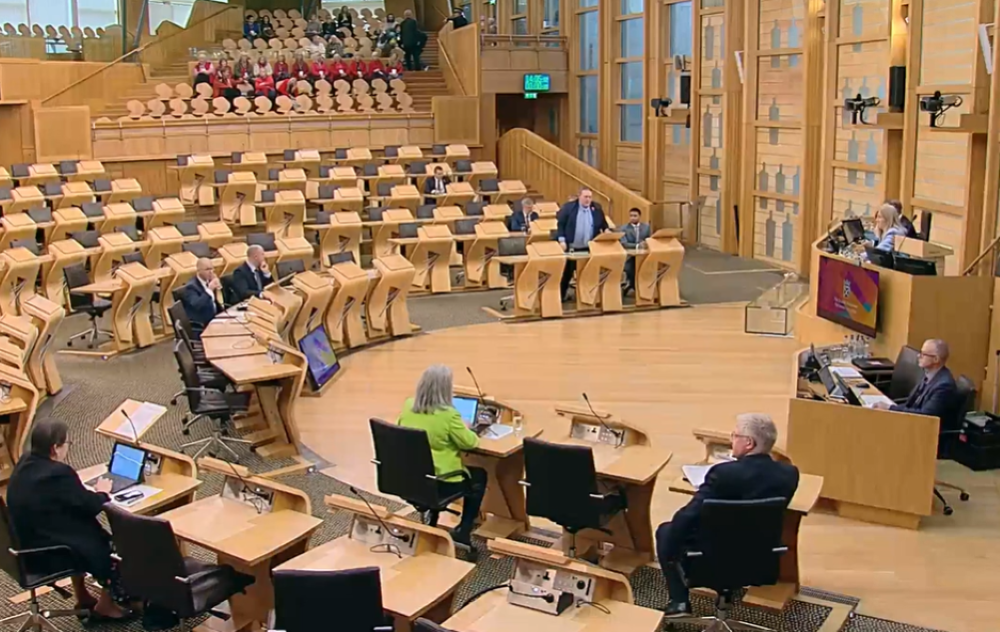Copyright theorkneynews

MSPs have raised concerns in the Scottish Parliament about the Scottish Government’s Future Farming Investment Scheme (FFIS). The FFIS was launched in July to offer flexible capital grants to support investments in efficiency, nature and climate friendly farming. 7,584 applications were received by the deadline. After sustained lobbying by NFU Scotland, the Scottish Government significantly increased the scheme’s budget earlier this year, taking total available funding to over £21.4 million. Andrew Connon, NFUS President, said in a statement: “The volume of applications submitted exceeded the funding available and is a clear sign of the ambition, forward-thinking and investment mindset within Scotland’s farming community. “ Although some had been successful, Andrew Connon, pointed out that many who felt they were eligible were not. He said: “Initial feedback from our members has focused around perceived inconsistencies in how applications have been assessed and the low success rate among the Ministerial Priority Groups. Clearly these issues need to be better understood in the days and weeks ahead and we will be seeking further discussions with the Scottish Government to do so. “We remain encouraged by the clear and growing appetite across the industry to invest in sustainability, productivity and resilience. That level of demand highlights why long-term, well-funded investment schemes remain vital to the future of Scottish agriculture. “Although NFU Scotland is not responsible for administering or assessing applications, we will continue to play an active role in representing members’ views during the development of such schemes. “ In the Scottish Parliament Highlands and Islands Conservative MSP Jamie Halcro Johnston raised the issue at Topical Question Time on 4 November. He asked ” how decisions on the award of offers of grants for the future farming investment scheme were made. (S6T-02727)” He continued: “The scheme was supposed to help priority groups such as young farmers, new entrants to farming, tenants and island businesses, but only about one third of the total funding has gone to those groups. “The figures that are available suggest that larger and longer-established farming businesses on the mainland of Scotland were successful, which has left many farmers and crofters struggling to understand what the scoring criteria were—some suggest that selection was just a lucky dip and others say that names were pulled from a hat.” He listed a series of specific question to be answered by the Minister. Can the minister set out the process by which his officials decided who was successful? Was artificial intelligence used at all in the process? Can he explain why many applicants who met four or five of the priorities were unsuccessful while others who met none have been offered grants? Jim Fairlie is the Scottish Government Minister for Agriculture and Connectivity. He explained: “The FFIS scoring model applied six core objectives: business efficiency, business sustainability, environmental protection, greenhouse gas reduction, climate adaptation and public good. “Funding requests were assessed to recognise realistic and proportionate applications, ensuring value for money. “Equity adjustments were applied for smaller and lower-capital businesses and a 20 per cent priority multiplier was applied to new entrants, young farmers and small business tenants. “Priority status alone did not guarantee funding, because, as I have already said, applicants also had to demonstrate strong alignment with scheme objectives and the ability to deliver measurable outcomes.” Jamie Halcro Johnston continued to press the Minister accusing the scheme of being rushed and that thousands of farmers and crofters have been left disappointed. Jim Fairlie came under fire from several MSPs who represent island communities where farming has been hit hard with the loss of funding that used to come in when the UK was a member of the European Union. Highlands and Islands Labour MSP Rhoda Grant said that ‘thousands ‘a huge number’ of applications from farmers and crofters in the region had been unsuccessful. She asked: “Why was less than 3 per cent of the funding used to support islanders despite there being no shortage of applications? Was an island communities impact assessment carried out?” Eventually in this heated debate some figures emerged: there were more than 7,000 claims 3,539 people (47%) were not prioritised for funding because they did not meet one or more of the eligibility and compliance requirements Orkney accounted for only 3.7% of successful applications (3.5% of the total budget) The Minister concluded by stating that he would learn from this and that “We will ensure that the kind of support that we are putting in place—which is working for Scottish farming—is better targeted in the future.” NFU Scotland is already engaging with the Scottish Government over the FFIS. They want the scheme to : Reflect the scale of ambition across Scottish agriculture; Are designed to be as clear, fair and accessible as possible; Provide applicants with confidence throughout the process. Those who wish to share their experience with the FFIS application process are encouraged to get in touch with their regional manager or email at contactus@nfus.org.uk. You can watch the Q & A with the Minister here: Fiona Grahame



